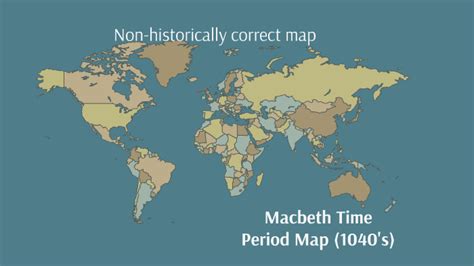The time period setting of Macbeth, a tragic play written by William Shakespeare, is a crucial element in understanding the themes, characters, and plot of the story. The play is set in medieval Scotland, during the 11th century, a time of great turmoil and upheaval.
The Historical Context
In the early 11th century, Scotland was a country in chaos. The Vikings had invaded the land, and the Scottish monarchy was in a state of flux. King Duncan, the ruler of Scotland, was trying to unite the warring clans and establish a strong central government. However, his efforts were thwarted by the constant threat of Viking raids and the internal power struggles within the Scottish nobility.

The Influence of Christianity
During this time period, Christianity was spreading rapidly throughout Scotland, and the Church was becoming a powerful force in the country. The play reflects this influence, with many characters invoking God and the Christian faith to justify their actions. Macbeth, in particular, is haunted by his own guilt and the fear of divine retribution for his crimes.
The Cultural Significance
The time period setting of Macbeth also reflects the cultural values and traditions of medieval Scotland. The play is filled with references to Scottish folklore, mythology, and superstition. The witches, for example, are a manifestation of the Scottish belief in the supernatural and the power of magic.
**The Impact on the Characters**
The time period setting of Macbeth has a significant impact on the characters and their motivations. The play is set in a society where honor, loyalty, and reputation are paramount. Macbeth, as a Scottish nobleman, is bound by these values and feels compelled to defend his honor and reputation at all costs.
Lady Macbeth's Ambition
Lady Macbeth, on the other hand, is driven by her own ambition and desire for power. She is a product of the patriarchal society of medieval Scotland, where women were marginalized and excluded from positions of power. Her actions are motivated by a desire to overcome these limitations and assert her own authority.

The Themes
The time period setting of Macbeth also influences the themes of the play. The play explores the consequences of sin and guilt, the corrupting influence of power, and the nature of evil. These themes are all relevant to the medieval Scottish context, where the Church and the monarchy were struggling to maintain order and stability.
**The Symbolism**
The time period setting of Macbeth is also reflected in the symbolism used throughout the play. The witches, for example, represent the unknown and the supernatural, which were deeply feared in medieval Scotland. The prophecies of the witches also reflect the Scottish superstition and belief in the power of fate.
The Imagery
The play is filled with imagery that reflects the medieval Scottish context. The descriptions of nature, for example, are often dark and ominous, reflecting the turmoil and chaos of the time period. The imagery also reflects the Scottish culture and traditions, such as the use of tartans and the reference to Scottish folklore.

**The Relevance to Modern Society**
Despite being written over 400 years ago, Macbeth remains a relevant and thought-provoking play in modern society. The themes of power, corruption, and the nature of evil are timeless and continue to resonate with audiences today. The play also raises important questions about the nature of morality and the consequences of sin and guilt.
Conclusion
In conclusion, the time period setting of Macbeth is a crucial element in understanding the play's themes, characters, and plot. The play reflects the medieval Scottish context, with its own unique cultural values and traditions. The influence of Christianity, the cultural significance, and the impact on the characters all contribute to a rich and complex play that continues to fascinate audiences today.
Gallery of Macbeth Images






FAQs
What is the time period setting of Macbeth?
+The time period setting of Macbeth is medieval Scotland, during the 11th century.
What is the influence of Christianity on the play?
+Christianity has a significant influence on the play, with many characters invoking God and the Christian faith to justify their actions.
What is the cultural significance of the play?
+The play reflects the cultural values and traditions of medieval Scotland, including the superstition and belief in the supernatural.
